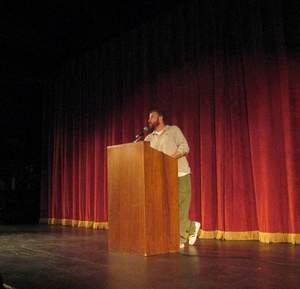Bright Shiny Morning

I have no beef with James Frey. I think he’s a talented writer; a zeitgeist of a generation; a younger and less punctuationally-correct Don DeLillo, of a sort; and I believe Oprah is a mean and deceitful ratings leech. I think memoir is a complicated genre at best, and I tend to believe most (if not all) of the story as told in this recent Vanity Fair article. I have a soft spot for the downtrodden that come out stronger after the fight, and I happen to think straight men with lisps who say “fuck” every third word are wildly underappreciated.
Enter Bright Shiny Morning, Frey’s third book and first in the wake of his much publicized fall from literary grace (also known as being “outed” for writing a memoir with a—gasp!—fictional flare in 2003’s A Million Little Pieces). A rather widely praised follow-up, Frey seemed to have rebounded with relative ease, considering the slander he has endured. I had the good fortune and required five dollars to see Frey in Boston last month, and his in-person readings are much like he writes—mostly stream-of-consciousness and unpretentious—particularly entertaining, even if you weren’t previously a fan or haven’t read anything he’s written. A man not bothered or interested in anyone’s perception of him or his work except his readers, I was excited about the book before I had my own copy, just because I like his no-nonsense attitude about the literati and run-on sentences.
Frey himself has called the novel, a fast moving 500 pages, a “love letter” to Los Angeles, and it certainly is in many ways. It also portrays a series of troubled characters in all their complicated glory and, for me, created mental images of deserted mini-golf courses and seedy motels that I still haven’t been able to shake. The novel haunted me for the week after I speedily read it while stuck in uncomfortable transit zones, like airplanes and airports, and in fact, I suspect I consumed it too fast. Processing a wide range of emotions so quickly made me feel like I’d just gone through all the stages of a serious relationship and breakup in less than seventy-two hours.
Vignettes coupled with four main storylines created a perfect blend of the static and constant, reflecting life as I understand it. These, interspersed with random “facts” and histories of Los Angeles, kept me turning the pages frantically, wondering when my favorite story lines would return, loving the pages that held a single sentence, wondering often what was a true detail about L.A. (despite the publisher’s insistence that not one word of the novel should be taken as fact).
Without giving too much away, Bright Shiny Morning is a novel for postmodern, hopeful cynics, who believe in universal truths and the beauty of sadness. It has my highest recommendation.
Photo credit: Andreas Haugstrup Pedersen